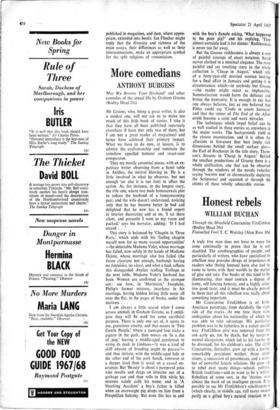More comedians
ANTHONY BURGESS
May We Borrow Your Husband? and other comedies of the sexual life by Graham Greene (Bodley Head 21s)
Mr Greene, who, being a great writer, is also a modest one, will not ask us to make too much of this little book of stories. I take it that they have all been published separately elsewhere (I have met only two of them, but I am not a great reader of magazines) and hence have achieved their primary impact. What we have to do now, at leisure, is to admire the craftsmanship and ruminate the somehow appalled humour and sweet-sour compassion.
They are mostly autumnal pieces, with an ex- patriate writer observing from a hotel table in Antibes, the mistral blowing in. He is a little involved in what he observes, but not enough (or else it is too late) to affect the action. As, for instance, in the longest story, the title one, where two male homosexuals plot to seduce the husband of a honeymooning pair, and the wife doesn't understand, noticing only that he has become better in bed and delighted that he now has a friend expert in interior decorating and so on. 'I sat there silent, and presently I went to my room and packed,' says the narrator, adding: `If I had stayed . .
This story is balanced by 'Chagrin in Three Parts,' which ends with his 'feeling chagrin myself now for so many wasted opportunities' —the delectable Madame Volet, whose marriage has failed, now safely in the hands of Madame Dejoie, whose marriage also has failed (the facon classique not enough, husbands having no fantaisies, no vices), and what a fool, reflects this disregarded Anglais reading Trollope at the next table, Madame Volet's husband has been. Women are confirmed as the stronger sex: see how, in `Mortmain,' Josephine, Philip's former mistress, interferes in his marriage, having hidden loving little notes all over the flat, in the pages of books, under the mattress . . .
I am always a little scared when I come across animals in Graham Greene, as I antici- pate they will be used for some sacrificial purpose. There is only one act of, it seems to me, gratuitous cruelty, and that occurs in 'Two Gentle People,' where a teenaged lout kicks a pigeon in the park, then moves on 'in a din of pop,' leaving a middle-aged gentleman tb wring its neck in kindness—'it was a kind of skill anyone of breeding ought to possess'— and thus initiate, with the middle-aged lady at the other end of the park bench, converse at a deeper level than is usual on a casual en- counter. But 'Beauty' is about a pampered peke who revolts and drags an intestine out of a garbage can and then rolls in filth while his mistress vainly calls his name, and in 'A Shocking Accident' a boy's father is killed when an overweight pig drops on him from a Neapolitan balcony. But even this has to end
with the boy's fiancie asking, 'What happened to the poor pig?' and his replying, `They almost certainly had it for dinner.' Ruthlessness is never too far away.
But the Greene ruthlessness is always a sort of painful courage of exact notation, bared nerves clothed in a minimal elegance. The most painful and yet touching story in the whole collection is 'Cheap in August,' which- tells of a forty-year-old married woman looking for a final affair in Jamaica and getting it in circumstances which—in anybody but Greene —the reader might reject as implausible. Summarisation would harm the delicacy and bruise the humanity. It is enough to say that one always believes, just as one believed that Pinky could say 'Credo in unum Satanunz' and that the sinner of The End of the Affair could become a saint and work miracles.
The techniques which impel belief can be as well studied in these stories as anywhere in the major works. The backgrounds yield to the closest examination, and it is often the allusions to literature that best imply rich dimensions behind the small surface plot— the Earl of Rochester in the title story, Thom- son's Seasons in 'Cheap, in August.' Behind the smallest productions of Greene there is a whole civilisation, one that can be observed through the windows of the novels (whether saying 'SALOON BAR' or chromatically depicting the Scriptures) and squinted at through the chinks of these wholly admirable stories.






































 Previous page
Previous page